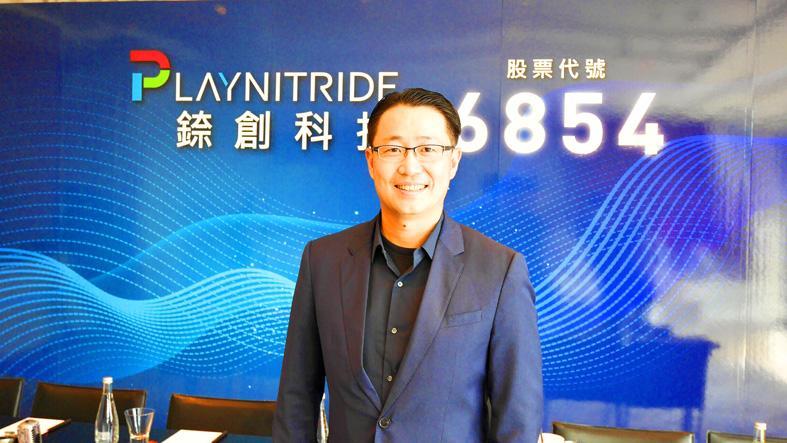PlayNitride Inc (錼創科技), which supplies chip carriers for micro LED and various micro LED products, is to debut on the Taiwan Stock Exchange’s Taiwan Innovation Board today — making it the first company to trade on the new board, which was launched in July last year.
The Cayman Islands-registed company applied for the local listing in February and obtained regulatory approval in April.
The exchange has encouraged start-ups to list on the new board regardless of their profit performance as it focuses more on their market potential.

Photo: Fang Wei-chieh, Taipei Times
PlayNitride posted a net loss of NT$1.21 billion (US$40.36 million) last year, or losses per share of NT$14.14. It posted losses per share of NT$1.17 in the first quarter, company data showed.
In the first seven months of this year, its cumulative revenue reached NT$220 million, up 255 percent from a year earlier.
“Our revenue for the first seven months has surpassed that for the whole of last year, and we expect the momentum to continue in the following years,” the Chinese-
language Liberty Times (the Taipei Times’ sister publication) quoted PlayNitride chairman Charles Li (李允立) as saying at a media briefing in Taipei yesterday.
Li is positive about the outlook for micro LEDs, which can be used in more innovative fields such as automotive displays and augmented reality devices, he said.
PlayNitride mainly produces six-inch micro LEDs and manufactures 1,500 to 2,000 units monthly, he added.
Li said the company might still be in the red this year, but is expected to turn a profit next year at the earliest.

Taiwan Semiconductor Manufacturing Co (TSMC, 台積電) last week recorded an increase in the number of shareholders to the highest in almost eight months, despite its share price falling 3.38 percent from the previous week, Taiwan Stock Exchange data released on Saturday showed. As of Friday, TSMC had 1.88 million shareholders, the most since the week of April 25 and an increase of 31,870 from the previous week, the data showed. The number of shareholders jumped despite a drop of NT$50 (US$1.59), or 3.38 percent, in TSMC’s share price from a week earlier to NT$1,430, as investors took profits from their earlier gains

In a high-security Shenzhen laboratory, Chinese scientists have built what Washington has spent years trying to prevent: a prototype of a machine capable of producing the cutting-edge semiconductor chips that power artificial intelligence (AI), smartphones and weapons central to Western military dominance, Reuters has learned. Completed early this year and undergoing testing, the prototype fills nearly an entire factory floor. It was built by a team of former engineers from Dutch semiconductor giant ASML who reverse-engineered the company’s extreme ultraviolet lithography (EUV) machines, according to two people with knowledge of the project. EUV machines sit at the heart of a technological Cold

TAIWAN VALUE CHAIN: Foxtron is to fully own Luxgen following the transaction and it plans to launch a new electric model, the Foxtron Bria, in Taiwan next year Yulon Motor Co (裕隆汽車) yesterday said that its board of directors approved the disposal of its electric vehicle (EV) unit, Luxgen Motor Co (納智捷汽車), to Foxtron Vehicle Technologies Co (鴻華先進) for NT$787.6 million (US$24.98 million). Foxtron, a half-half joint venture between Yulon affiliate Hua-Chuang Automobile Information Technical Center Co (華創車電) and Hon Hai Precision Industry Co (鴻海精密), expects to wrap up the deal in the first quarter of next year. Foxtron would fully own Luxgen following the transaction, including five car distributing companies, outlets and all employees. The deal is subject to the approval of the Fair Trade Commission, Foxtron said. “Foxtron will be

INFLATION CONSIDERATION: The BOJ governor said that it would ‘keep making appropriate decisions’ and would adjust depending on the economy and prices The Bank of Japan (BOJ) yesterday raised its benchmark interest rate to the highest in 30 years and said more increases are in the pipeline if conditions allow, in a sign of growing conviction that it can attain the stable inflation target it has pursued for more than a decade. Bank of Japan Governor Kazuo Ueda’s policy board increased the rate by 0.2 percentage points to 0.75 percent, in a unanimous decision, the bank said in a statement. The central bank cited the rising likelihood of its economic outlook being realized. The rate change was expected by all 50 economists surveyed by Bloomberg. The